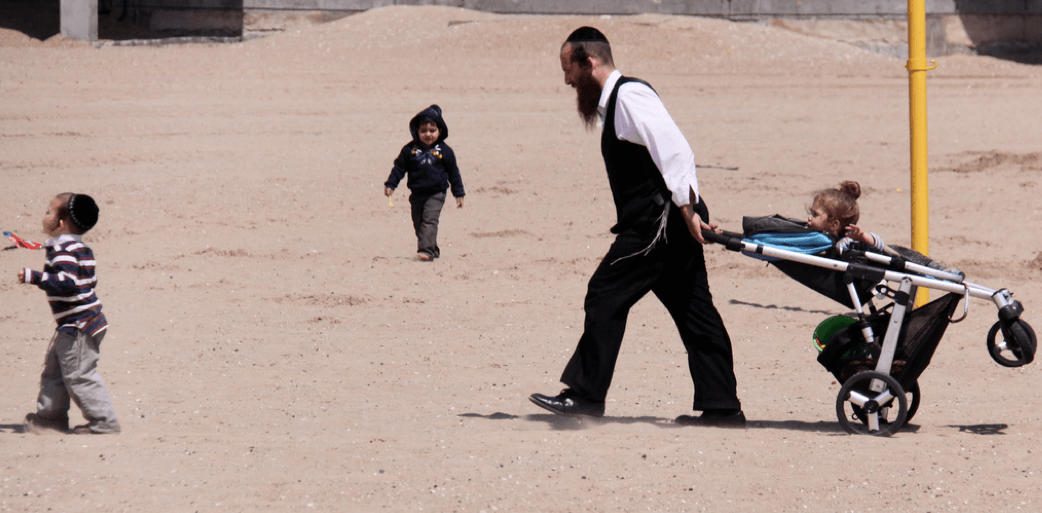 It’s Father’s Day, and articles fill the internet about men who defied the masculine stereotype of being tough, distant workaholics.
It’s Father’s Day, and articles fill the internet about men who defied the masculine stereotype of being tough, distant workaholics.
Changing diapers. Working at home. The world is a very different place nowadays than it was a few decades ago.
The last place that many would look for inspiration for modern fatherhood is the Old Testament. If anything, many feel that the Old Testament would be more embracing if it was cleansed of the maleness of God. If God neither male nor female, shouldn’t pronouns that refer to God be as neutral as possible?
It’s often been pointed out that when God is called El Rahum (“compassionate God”), the word for “compassion” is related to that for “womb.” So is God being described as female, as having a womb?
No, actually. The problem here is our Western cultural assumptions about male and female. A couple verses about the fatherhood of God in the Old Testament reveal what’s going on.
Look at Psalm 103:13. Here’s a word-for-word version:
“As the compassion (rahem) of a father for his children, so is the compassion (riham) of the Lord is for those who fear/revere him.”
 In this verse we see that same “womb” word for compassion that describes God is being applied to men. Of course fathers are compassionate. Fathers are fully capable of showing gentle, loving care to their children, and God is nurturing as any earthly father is.
In this verse we see that same “womb” word for compassion that describes God is being applied to men. Of course fathers are compassionate. Fathers are fully capable of showing gentle, loving care to their children, and God is nurturing as any earthly father is.
In the Middle East, fathers are very involved with their families and often carry their children in their arms. It’s us in the West who have decided that masculinity, by definition, must be that of a tough, solitary cowboy. Then we assume that our distorted male imagery applies to God too.
Deuteronomy 1:31 also illustrates Middle Eastern fatherhood beautifully. There, Moses reminds Israel of the loving protection God showed them as he led them out of Egypt by saying,
The LORD your God carried you, as a father carries his son, all the way you went until you reached this place. (NIV)
 The picture here is a dad lifting a little boy into his arms, carrying him on his shoulders when he’s too tired to walk. What an intimate, loving image of God. Some Bible translations, however, neutralize the male pronouns in this verse:
The picture here is a dad lifting a little boy into his arms, carrying him on his shoulders when he’s too tired to walk. What an intimate, loving image of God. Some Bible translations, however, neutralize the male pronouns in this verse:
…the Lord your God carried you, just as one carries a child… (NRSV)
But by doing so, we lose the beautiful scene of a man gently carrying a precious son. Ironically, we miss this lovely image of fatherly tenderness when we take the maleness out of it.
In all our conversations about the “maleness” or “femaleness” of God, we forget that our culture colors our ideas about these categories. What if, instead of changing God’s gender, we revised our ideas of masculine and feminine instead?
~~~~~
(Images: Chrisgold, Tim Moore, AbrahamPath, TravelReportage)

Celeste says
Love it!
Mary says
One time in a grocery store parking lot in Tiberias, a little child was crying, and I heard “Bo le Abba” (come to daddy) So touching.
I also was observing an Israeli dad, when we had a bunch of company here in the states, pick up someone else’s baby to comfort him. I was so impressed.
Sandy says
I had a father who was absent most of my childhood. Typical of the western culture. He lost both his parents when he was a child.God has closed the gap I had with my earthly father because of my relationship with my heavenly FATHER.
Kevin says
I am reminded of the Aaronic blessing in Numbers 6:22-27. I read in a commentary (I forget which one) that said Jewish thought on these verses is a word picture of a father holding his child over his head, turning his face to the child, shining on the child; what peace is given to a child held over a loving dad’s head, gazing down into daddy’s loving eyes.
One can imagine our Heavenly Father holding us up over His head and us gazing into the loving eyes of our creator and author of our salvation.
Manlio H says
It is the same attitude here in my culture, many fathers used to comfort someone else’s baby.I used to do that because I love my own children. I am from Oaxaca Mexico by the way.
Nancy Johnsen says
I attended my mother’s Episcopal Church while visiting on Sunday and was distressed by the gender neutralization of the liturgy. Something is lost when we choose to ignore the personhood and the Fatherhood of our Mighty God.
Rachel says
I just love learning about the masculinity of God, and then learning of His tender affection. It’s like seeing a big (bulky muscular) father who looks like he could be really tough but instead is loving on his child with big bear hugs and kisses and protecting the child. The only thing I feel kind of sad and disappointed about is that in Bible verses and even with sermons and analogies, the object of God’s affection seems to always be a son, never a daughter. I, being a girl, feel a little left out of His affection.
Lois Tverberg says
Rachel, thanks for sharing. Personally, I don’t get upset over not finding cultural images that preach a certain comforting message. The biblical world was full of sinners who had not-so-nice cultural attitudes, and it’s up to us to read it through that filter.
Personally, I think that a lot of men struggle with unaffectionate fathers in our culture. Boys are told “do not cry” and are expected to pull themselves together without the comfort that girls get. I think men have it much worse than women in terms of not having parental affection. Also, our culture places little emphasis on fatherly nurturing in comparison to motherly nurturing. Both of these things we can learn from an alternative (but imperfect) cultural perspective.